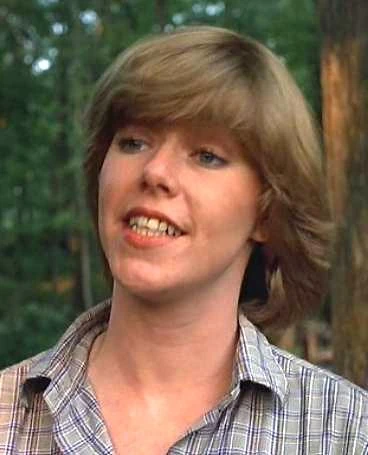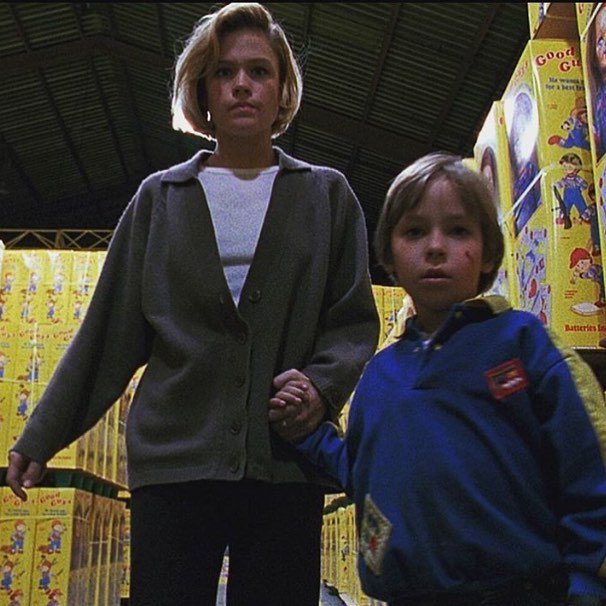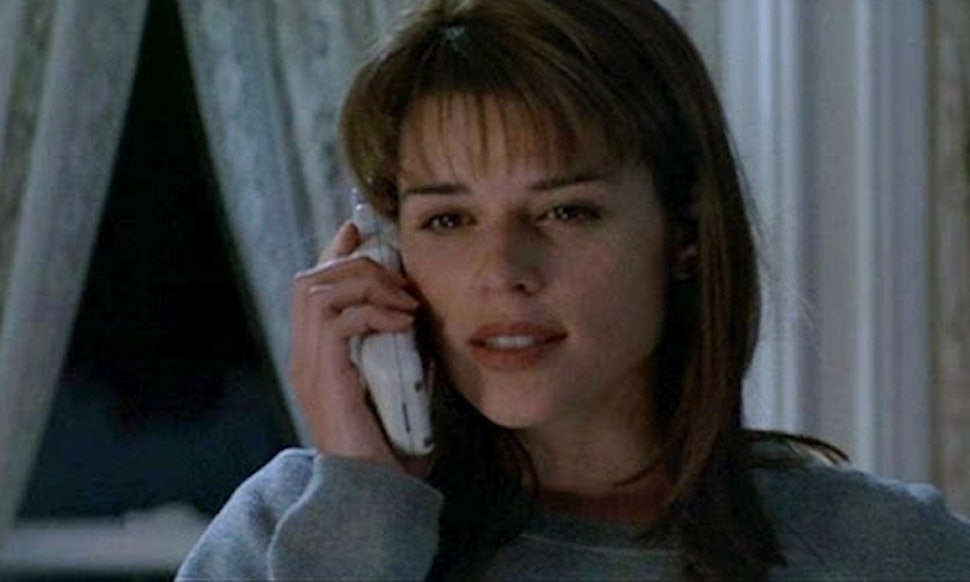PET SEMATARY is making its way back to the big screen in a little less than half a year. The reimagining, as they call them now will be making its way to theaters across the country this April. Believe it or not, it's a film I have to prepare for. It's not one that I can simply go to and watch. I have to mentally as well as emotionally prepare myself to watch it.
You see the 1989 film is what I consider to be the scariest film I have ever seen. Terrifying and above all disturbing. Like the wendigo within the story, it "f's" with me all it wants to, in jumbling emotions in my head. The tragic shock of Gage's death, into the aching pain of grief, that manifest its way into bone chilling fear. Like the ground turned sour, the terror built up within my body is frozen, stony and solid.
As I watched the film though, I found myself being rather critical of it. I suppose it is my way of getting my mind off of the depression and gut wrenching horror of the core of the story. If I can remove myself as simply a viewer, and look at the film as a fellow writer, I can remind myself as I need to, that this is simply a story. None of this is real. None of this really happened. It's nothing more than the imagination of Stephen King.
The first thing I have to say is that while Stephen King is damn near impeccable as a novelist, he's a shadow of himself as a screenwriter. Whereas he leaves nothing out in his novel, even at times seeming too detailed, he omits way too much information, valuable information in his screenplay.
As I read the novel, most of what didn't make sense in the film, came together. Most of the questions I had, were answered. Let me address them now.
The Character of Victor Pascow seems pointless or even detrimental
In the film, Victor Pascow seems pretty pointless. It seems at first that he is like a warning telling the Titanic it is headed into a field of ice, but then seems to steer the ship straight towards the burg. Why didn't he warn Jud of Gage's presence? Why if his intention of trying to get Rachel back home, so she could prevent Louis from burying Gage in the Micmac burial ground, did he seemingly lead her to her death? If you watch the film, it's hard to conclude otherwise. He lures her back to Ludlow, essentially leading her to Jud's home and ultimately to her death. It's almost as if he knew that were to happen and as if he wanted it.
In the novel, he's not as much of a presence. Yet his purpose still seems a bit questionable. He says, "I'm only allowed to warn, I'm not allowed to interfere" in both adaptations of the story. Why? For story's convenience is why, but it would be interesting to see if King has an actual answer to this question. Is the Wendigo too powerful for Pascow to face? Is it God preventing Pascow from interfering. Although King never comes out and outright says this, it's almost a play on the Biblical belief of free will. As if Louis Creed has to make his own choice. He has to make the decision in what to do or not to do, and upon that decision should he face the consequences of his action.
Why the ground turned sour.
In the film, all we know is that the Micmac burial ground turned sour years ago and has demonic, magical power. We don't know how or when it became that way, but we know it is that way. In the novel, it is explained in detail that during a winter famine, the Micmacs dug up bodies buried their and ate them to avoid starvation. A Wendigo came in, cursing the ground and turning it sour.
Jud having Louis bury Church
In the film, Jud dragging Louis up to the Micmac burial ground to bury Church seems to be rather idiotic. Knowing what we know, it not only seems to go against Jud's better judgment but it outright makes Jud look like an imbecile. In the film when he buries his dog Spot, the dog comes back rabid, mad and vicious. He makes it clear upon Spot's second death, that this time he let a dead dog lie. With that prior information, why would he have Louis bury Church? I already know an answer you might give me. Because Ellie wasn't ready to deal with his death yet, and in response to that answer, I'll say that the novel made more sense. A lot more sense.
First and foremost the novel includes the character of Jud's wife, Norma who is essential to the plot of Jud's decision. During the events of the book, Norma suffers a heart attack and Louis saves her life. In a debt of gratitude for saving Norma, Jud feels compelled to repay Louis for his good act. Therefore when Church dies, it makes sense when Jud takes Louis to the Micmac burial ground to bury Church. A life for a life if you will.
Secondly, in the film, when Spot comes back from the burial ground, he's rabid, mad and aggressive. Viscous and growling. In the book, he comes back rather docile. A once lively and happy dog, now lethargic and mundane. Lifeless, but not threatening. Jud describes giving him a bath like washing a piece of meat. In the book Jud's experience with his dog was depressing, but he never felt in danger because of the dog. He never feared the dog. It made more sense why he was trusting of the Micmac burial ground to bring Church back, than what it did in the film.
Louis isn't as Stupid as He Appears in Regards to Burying Gage
In the film, the only thing that makes sense about Louis burying Gage in the Micmac burial ground is that what grieving father wouldn't? In the novel is makes a bit more sense. For one, Louis reasons that like Spot and Church, Gage might come back lifeless and mundane, but not threatening. He concludes that it might be like raising an autistic son or one with a severe mental disability. He outright ask Rachel how she would have felt about Gage if he had been born retarded.
Secondly, after hearing Jud talk about Timmy Baterman, Louis figures that the experience might be similar. That if Gage comes back, Louis can observe him for a while and then make the diagnosis on whether to keep him or send him back to the grave. Bill, Timmy's father had to make that decision forty three years earlier, and Louis decided if need be, he could to.
Which then leads to another important question....
Why Gage Kills
From a structural standpoint Louis's decision had to have dire consequences. If something like someone else dying wasn't at stake, then it cheats the audience of the inevitable payoff that has been setup through prior action. However, within the confines of the story, one has to question why Gage kills Jud as quickly as he does.
Here's why the question must be asked.
Timmy Baterman was back for approximately four days to a week. Within that time, he caused the people of Ludlow a lot of psychological torment but he never killed anyone. In the book he never even physically harms anyone. Even in the film, his only physical harm of anyone is with his father as he tries to keep him in the burning house.
So why, if Timmy Baterman doesn't kill anyone in the four to six days or so he was back, does Gage kill two people in the small amount of time he was back? Exact time he was back, estimated to be about five to eight hours. First off let's look at Jud.
The Wendigo could have wanted revenge on Jud for leading the brigade to end the abomination that was the resurrected Timmy Baterman. In the film, Forty three years earlier, Jud Crandall was responsible for sending Baterman back to the grave. Angered and vengeful, it would make sense that now through Gage, the Wendigo sought out revenge by killing Jud.
It could also be because maybe the Micmac burial ground is haunted by an assortment of different daemons. Perhaps the daemon that possessed Timmy Baterman wasn't as homicidal as the daemon that possessed Gage Creed.
Which then leads to Rachel's death. Obviously for the sake of a doom and gloom ambiguous ending, Louis needed someone to bury. Within the confines of the story this makes sense to. At least to a degree. The Wendigo understood that a crazed and grieving Louis would return to the Micmac burial ground to bury Rachel. Therefore that is why Rachel was killed and why Louis's life was sparred.
Why Louis is able to Kill Gage
In the novel, Louis has a fairly simple time killing Gage. There is a struggle but it is fairly brief and Louis comes out unscathed. He simply holds Gage's hand down with Gage screaming, "No! No! No!" in a tantrum as he shoved two syringes, one into the small of his back and the other into his arm, full of morphine. In the film the struggle is far greater. Gage slices Louis up pretty good, wounding him with several lacerations in the upper torso and once across the left eyebrow. It takes all of Louis's strength to get Gage off of him. What's strange, is that when Gage collects himself and comes back after Louis, with relative ease Louis holds him gently as he slowly puts the morphine laced syringe into his neck.
Logically Gage didn't fight this because of two reasons. The Wendigo knew how heartbreaking and difficult it was for Louis to kill his son. Even though Louis knew that it wasn't really Gage, the disappointment that things hadn't worked out like he had wanted was enough to drive Louis mad. He wanted nothing more than for his son to be back with him. And the Wendigo knew that it could cause Louis no pain greater than the pain of having to send Gage back to the grave. Add in that the Wendigo also knew that Louis would bury Rachel in the Micmac burial ground, and I believe that gives us answer as to why he was able to kill Gage.
The "Waited to Long" reasoning of Louis Creed
In both the novel and the film, Louis concludes that the reason Gage came back demonic and evil was because he waited too long before burying him. That if he had buried him sooner, that he might have came back his old self or in the least, not demonic. After watching the film and reading the novel, I may have missed something because I cannot make sense of his reasoning. There is nothing to indicate that burying in the Micmac burial ground is time sensitive. That time passed will have any effect whatsoever on whatever is buried their. How and why Louis comes to this conclusion is pure lunacy and maybe that's what King was going for. Obviously Louis by this point was bat shit crazy, and by having him rant about waiting too long, simply illustrated how far gone he was. I don't know.
Why is there such a long wait?
It seems odd that in eighty-four years of living in Ludlow, that Jud has had so few experiences with the Micmac burial ground. Even more bizarre that the only experience with a human being buried was when he was in his early forties. He even says at eighty-three years old that he hadn't been up to the burial gounds in twelve years. So before taking Louis up their to bury Church, he hadn't been up there since he was 71. Before that, it seemed he hasn't been up there himself in fifty plus years since burying spot. Speaking of how the burial ground had an effect on him, and how it made you tell others of its presence and of its power, it makes me wonder why there was such a long wait. Surely Jud would have shared the secrets with others long before he ever met Louis.
And maybe he did....
Then again, maybe he didn't.
And maybe that's why he did share it with Louis. Maybe he had fought the urge to tell others about the Micmac burial ground for such a long time and now his time was up. He was nearing the end of his life and the power of the Wendigo, refusing to let him die without sharing the secret, is what made Jud finally share it with Louis.
In Regards to the New Film
This is such a frightening story. The concept alone is enough to make the hair on your arms rise and the heart in your chest beat a little faster. I hope to God that this film doesn't have any jump scares or sudden startles. It doesn't need any. If anything jump scares will diminish the actual horror of the story. Zelda and Gage don't need any cheap thrills to send urine down the pant legs of audience members. They can do that on their own.
I am excited to see this new rendition of PET SEMATARY and I'm anxious to see how they address the issues that I bring up in this blog. I don't see anyone cast as Norma Crandall, so I'm taking it that she'll once again be omitted from the story. I also don't see anyone cast as Timmy Baterman and I hope that he's simply not mentioned in the cast. I think it's a mistake to not have the reenactment of his resurrection. It adds so much depth to the story.
You see the 1989 film is what I consider to be the scariest film I have ever seen. Terrifying and above all disturbing. Like the wendigo within the story, it "f's" with me all it wants to, in jumbling emotions in my head. The tragic shock of Gage's death, into the aching pain of grief, that manifest its way into bone chilling fear. Like the ground turned sour, the terror built up within my body is frozen, stony and solid.
As I watched the film though, I found myself being rather critical of it. I suppose it is my way of getting my mind off of the depression and gut wrenching horror of the core of the story. If I can remove myself as simply a viewer, and look at the film as a fellow writer, I can remind myself as I need to, that this is simply a story. None of this is real. None of this really happened. It's nothing more than the imagination of Stephen King.
The first thing I have to say is that while Stephen King is damn near impeccable as a novelist, he's a shadow of himself as a screenwriter. Whereas he leaves nothing out in his novel, even at times seeming too detailed, he omits way too much information, valuable information in his screenplay.
As I read the novel, most of what didn't make sense in the film, came together. Most of the questions I had, were answered. Let me address them now.
The Character of Victor Pascow seems pointless or even detrimental
In the film, Victor Pascow seems pretty pointless. It seems at first that he is like a warning telling the Titanic it is headed into a field of ice, but then seems to steer the ship straight towards the burg. Why didn't he warn Jud of Gage's presence? Why if his intention of trying to get Rachel back home, so she could prevent Louis from burying Gage in the Micmac burial ground, did he seemingly lead her to her death? If you watch the film, it's hard to conclude otherwise. He lures her back to Ludlow, essentially leading her to Jud's home and ultimately to her death. It's almost as if he knew that were to happen and as if he wanted it.
In the novel, he's not as much of a presence. Yet his purpose still seems a bit questionable. He says, "I'm only allowed to warn, I'm not allowed to interfere" in both adaptations of the story. Why? For story's convenience is why, but it would be interesting to see if King has an actual answer to this question. Is the Wendigo too powerful for Pascow to face? Is it God preventing Pascow from interfering. Although King never comes out and outright says this, it's almost a play on the Biblical belief of free will. As if Louis Creed has to make his own choice. He has to make the decision in what to do or not to do, and upon that decision should he face the consequences of his action.
Why the ground turned sour.
In the film, all we know is that the Micmac burial ground turned sour years ago and has demonic, magical power. We don't know how or when it became that way, but we know it is that way. In the novel, it is explained in detail that during a winter famine, the Micmacs dug up bodies buried their and ate them to avoid starvation. A Wendigo came in, cursing the ground and turning it sour.
Jud having Louis bury Church
In the film, Jud dragging Louis up to the Micmac burial ground to bury Church seems to be rather idiotic. Knowing what we know, it not only seems to go against Jud's better judgment but it outright makes Jud look like an imbecile. In the film when he buries his dog Spot, the dog comes back rabid, mad and vicious. He makes it clear upon Spot's second death, that this time he let a dead dog lie. With that prior information, why would he have Louis bury Church? I already know an answer you might give me. Because Ellie wasn't ready to deal with his death yet, and in response to that answer, I'll say that the novel made more sense. A lot more sense.
First and foremost the novel includes the character of Jud's wife, Norma who is essential to the plot of Jud's decision. During the events of the book, Norma suffers a heart attack and Louis saves her life. In a debt of gratitude for saving Norma, Jud feels compelled to repay Louis for his good act. Therefore when Church dies, it makes sense when Jud takes Louis to the Micmac burial ground to bury Church. A life for a life if you will.
Secondly, in the film, when Spot comes back from the burial ground, he's rabid, mad and aggressive. Viscous and growling. In the book, he comes back rather docile. A once lively and happy dog, now lethargic and mundane. Lifeless, but not threatening. Jud describes giving him a bath like washing a piece of meat. In the book Jud's experience with his dog was depressing, but he never felt in danger because of the dog. He never feared the dog. It made more sense why he was trusting of the Micmac burial ground to bring Church back, than what it did in the film.
Louis isn't as Stupid as He Appears in Regards to Burying Gage
In the film, the only thing that makes sense about Louis burying Gage in the Micmac burial ground is that what grieving father wouldn't? In the novel is makes a bit more sense. For one, Louis reasons that like Spot and Church, Gage might come back lifeless and mundane, but not threatening. He concludes that it might be like raising an autistic son or one with a severe mental disability. He outright ask Rachel how she would have felt about Gage if he had been born retarded.
Secondly, after hearing Jud talk about Timmy Baterman, Louis figures that the experience might be similar. That if Gage comes back, Louis can observe him for a while and then make the diagnosis on whether to keep him or send him back to the grave. Bill, Timmy's father had to make that decision forty three years earlier, and Louis decided if need be, he could to.
Which then leads to another important question....
Why Gage Kills
From a structural standpoint Louis's decision had to have dire consequences. If something like someone else dying wasn't at stake, then it cheats the audience of the inevitable payoff that has been setup through prior action. However, within the confines of the story, one has to question why Gage kills Jud as quickly as he does.
Here's why the question must be asked.
Timmy Baterman was back for approximately four days to a week. Within that time, he caused the people of Ludlow a lot of psychological torment but he never killed anyone. In the book he never even physically harms anyone. Even in the film, his only physical harm of anyone is with his father as he tries to keep him in the burning house.
So why, if Timmy Baterman doesn't kill anyone in the four to six days or so he was back, does Gage kill two people in the small amount of time he was back? Exact time he was back, estimated to be about five to eight hours. First off let's look at Jud.
The Wendigo could have wanted revenge on Jud for leading the brigade to end the abomination that was the resurrected Timmy Baterman. In the film, Forty three years earlier, Jud Crandall was responsible for sending Baterman back to the grave. Angered and vengeful, it would make sense that now through Gage, the Wendigo sought out revenge by killing Jud.
It could also be because maybe the Micmac burial ground is haunted by an assortment of different daemons. Perhaps the daemon that possessed Timmy Baterman wasn't as homicidal as the daemon that possessed Gage Creed.
Which then leads to Rachel's death. Obviously for the sake of a doom and gloom ambiguous ending, Louis needed someone to bury. Within the confines of the story this makes sense to. At least to a degree. The Wendigo understood that a crazed and grieving Louis would return to the Micmac burial ground to bury Rachel. Therefore that is why Rachel was killed and why Louis's life was sparred.
Why Louis is able to Kill Gage
In the novel, Louis has a fairly simple time killing Gage. There is a struggle but it is fairly brief and Louis comes out unscathed. He simply holds Gage's hand down with Gage screaming, "No! No! No!" in a tantrum as he shoved two syringes, one into the small of his back and the other into his arm, full of morphine. In the film the struggle is far greater. Gage slices Louis up pretty good, wounding him with several lacerations in the upper torso and once across the left eyebrow. It takes all of Louis's strength to get Gage off of him. What's strange, is that when Gage collects himself and comes back after Louis, with relative ease Louis holds him gently as he slowly puts the morphine laced syringe into his neck.
Logically Gage didn't fight this because of two reasons. The Wendigo knew how heartbreaking and difficult it was for Louis to kill his son. Even though Louis knew that it wasn't really Gage, the disappointment that things hadn't worked out like he had wanted was enough to drive Louis mad. He wanted nothing more than for his son to be back with him. And the Wendigo knew that it could cause Louis no pain greater than the pain of having to send Gage back to the grave. Add in that the Wendigo also knew that Louis would bury Rachel in the Micmac burial ground, and I believe that gives us answer as to why he was able to kill Gage.
The "Waited to Long" reasoning of Louis Creed
In both the novel and the film, Louis concludes that the reason Gage came back demonic and evil was because he waited too long before burying him. That if he had buried him sooner, that he might have came back his old self or in the least, not demonic. After watching the film and reading the novel, I may have missed something because I cannot make sense of his reasoning. There is nothing to indicate that burying in the Micmac burial ground is time sensitive. That time passed will have any effect whatsoever on whatever is buried their. How and why Louis comes to this conclusion is pure lunacy and maybe that's what King was going for. Obviously Louis by this point was bat shit crazy, and by having him rant about waiting too long, simply illustrated how far gone he was. I don't know.
Why is there such a long wait?
It seems odd that in eighty-four years of living in Ludlow, that Jud has had so few experiences with the Micmac burial ground. Even more bizarre that the only experience with a human being buried was when he was in his early forties. He even says at eighty-three years old that he hadn't been up to the burial gounds in twelve years. So before taking Louis up their to bury Church, he hadn't been up there since he was 71. Before that, it seemed he hasn't been up there himself in fifty plus years since burying spot. Speaking of how the burial ground had an effect on him, and how it made you tell others of its presence and of its power, it makes me wonder why there was such a long wait. Surely Jud would have shared the secrets with others long before he ever met Louis.
And maybe he did....
Then again, maybe he didn't.
And maybe that's why he did share it with Louis. Maybe he had fought the urge to tell others about the Micmac burial ground for such a long time and now his time was up. He was nearing the end of his life and the power of the Wendigo, refusing to let him die without sharing the secret, is what made Jud finally share it with Louis.
In Regards to the New Film
This is such a frightening story. The concept alone is enough to make the hair on your arms rise and the heart in your chest beat a little faster. I hope to God that this film doesn't have any jump scares or sudden startles. It doesn't need any. If anything jump scares will diminish the actual horror of the story. Zelda and Gage don't need any cheap thrills to send urine down the pant legs of audience members. They can do that on their own.
I am excited to see this new rendition of PET SEMATARY and I'm anxious to see how they address the issues that I bring up in this blog. I don't see anyone cast as Norma Crandall, so I'm taking it that she'll once again be omitted from the story. I also don't see anyone cast as Timmy Baterman and I hope that he's simply not mentioned in the cast. I think it's a mistake to not have the reenactment of his resurrection. It adds so much depth to the story.






















